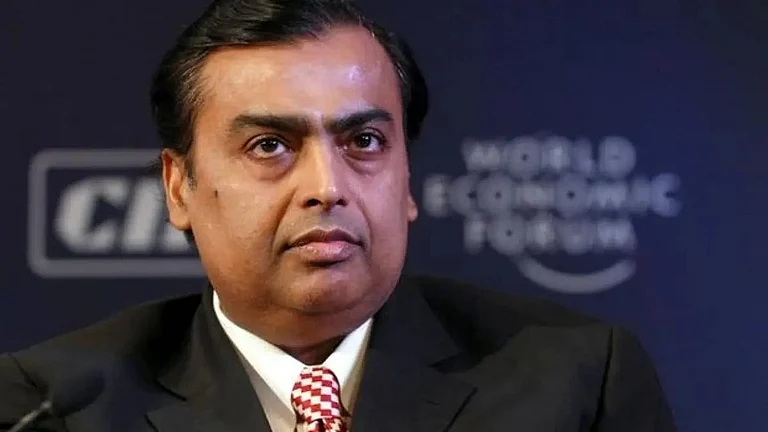Billionaire Mukesh Ambani on Thursday unveiled the next phase of growth at Reliance Industries Ltd, with retail and telecom worth over USD 100 billion each, doubling revenues and pre-tax profit in 3-4 years, new energy business becoming profitable by 2031, and core oil and chemical business continuing to be the robust growth engine.
The sprawling conglomerate with interests in refining, oil and gas, petrochemicals, telecoms, retail, and media is on track to more than double in size before the end of the decade, Ambani, chairman and managing director of Reliance, told company shareholders.
While the growing cash cow, the oil and chemicals business, Reliance will step up AI adoption and will launch 'Jio Brain' - a suite of AI tools and platforms - and set up gigawatt scale IA-ready data centres in Jamnagar in Gujarat "to create the world's lowest AI inferencing cost" to make such applications more affordable in India than anywhere else.
Ambani also announced upto 100 GB of free cloud storage for users of his group's telecom venture Jio - a move seen as disrupting the market.
Since its launch in 2016, Jio has climbed to being India's top telecom company and the world's largest data firm on the back of dirt-cheap data and free voice calling. That offering shook up the industry, and the free cloud storage may also trigger a similar pattern.
"We have built each of our businesses from scratch and grown them to a global scale. We did not receive them as largesse," Ambani said, adding that Reliance is not pursuing short-term profit or hoarding wealth but creating wealth and working to provide energy security.
Ambani said that in 2017, he promised that Reliance would enter the world's Top 50 before its Golden Jubilee. "I am pleased to inform you that this year, Reliance is among the world's Top 50 most valuable corporations".
In July 2018, Reliance crossed the USD 100 billion valuation mark, and in the next six years, it has become the first Indian company to cross USD 250 billion in market value.
"In 2022, I promised that Reliance would double its value by the time we complete 50 Glorious Years in 2027," he said, adding that the group "is well on track to more than double in size before the end of this decade and grow faster in the decades ahead".
He said three out of the five growth engines of Reliance - oil-to-chemical (O2C) business that houses oil refinery and petrochemical plants, retail comprising of both online and physical stores, telecom and digital venture Jio, media, and green energy - have a valuation of over USD 100 billion each and will continue to grow even faster.
O2C, retail and Jio are valued at over USD 100 billion each.
"Jio and Retail are expected to double their revenues and EBITDA in the next 3-4 years," he said. "Our new energy business will be the new jewel in Reliance's crown. I foresee it becoming as big and profitable over the next 5-7 years as our O2C business which we have built over the past 40 years."
Green fuels and AI-based solutions, he said, will become long-term growth engines for Reliance.
Media businesses, which are being combined with Disney India, have immense growth potential.
Minutes before the start of the annual general meeting, Reliance, in a stock exchange filing, said its board will on September 5 consider issuing bonus shares in the ratio of 1:1. This will be the first bonus share since 2017 and only the third since 2009.
Ambani said the bonus issue was rewarding shareholders who have been part of the Reliance growth story.
While the growth roadmap for retail and Jio is being considered indicators for a possible demerger and listing, the richest Asian did not give any indication of any such timelines.
Last year, he inducted all three of his children - Akash, Isha and Anant - on the board of Reliance in succession planning, and on Thursday said that "they have stepped up to take on greater responsibilities".
Akash looks after the telecom venture while Isha is in charge of retail. Anant looks after a new energy business.
With about 19,000 stores across 7,000+ cities and an e-commerce platform, the retail business is among the top 10 global retailers by market cap and among the top 30 by revenues.
Similarly, it has 490 million telecom users, with Jio carrying 8 per cent of global mobile traffic. It has completed the 5G rollout.
Ambani said Jio is targeting 100 million homes for its broadband service JioAirfiber, and building large-scale AI infrastructure to offer AI for all.
In the O2C, it is adding capacities across PVC and polyester and building India's first carbon fibre plant at Hazira in Gujarat, he said.
In the new energy space, he said the group is on track to investing the committed Rs 75,000 crore in establishing a new energy ecosystem. Production of solar photovoltaic (PV) modules will commence by the end of this year, with the target to achieve the first phase of integrated solar production facilities in the following quarters.
The integration will include modules, cells, glass, wafers, ingot, and polysilicon, with an initial annual capacity of 10 GW.
Reliance, he said, has begun construction of an integrated advanced chemistry-based battery manufacturing facility with a 30 GWh annual capacity at Jamnagar. Production will commence by the second half of next year.
Also, it has begun work on establishing a fully automated, multi-GW electrolyser manufacturing facility on the west coast of India, which will be ready by 2026.
"This giga-factory will be fully adaptable, capable of supporting various technologies such as Alkaline, PEM, and AEM," he said.
Ambani said his firm has leased arid wasteland in Kutch, just 250 kilometres from Jamnagar. "This wasteland has the potential to generate about 150 billion units of electricity in the next 10 years - providing nearly 10 per cent of India's energy requirements."
Reliance has already begun significant project development work and is building its transmission infrastructure to bring online solar generation projects.
In addition, it has secured access to nearly 2,000 acres of land at Kandla port to provide an avenue for the production, storage, evacuation, and shipping of green fuels to markets in India and abroad, he said.































